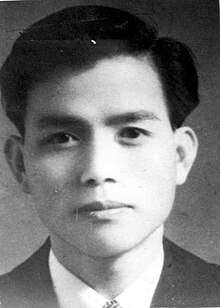Shin Hyun-hwak (Korean: 신현확; Hanja: 申鉉碻; October 29, 1920 – April 26, 2007) was Prime Minister of South Korea from December 13, 1979 to May 21, 1980,[1] representing the Democratic Republican Party.[2]
Shin Hyun-hwak | |
|---|---|
| 신현확 申鉉碻 | |
 | |
| Prime Minister of South Korea | |
| In office December 13, 1979 – May 21, 1980 | |
| President | Choi Kyu-hah |
| Preceded by | Choi Kyu-hah |
| Succeeded by | Park Choong-hoon (acting) |
| Personal details | |
| Born | October 29, 1920 Waegwan, Keishōhoku-dō (North Gyeongsang Province), Korea, Empire of Japan |
| Died | April 26, 2007 (aged 86) Seoul, South Korea |
| Alma mater | Keijō Imperial University |
| Korean name | |
| Hangul | 신현확 |
| Hanja | |
| Revised Romanization | Sin Hyeonhwak |
| McCune–Reischauer | Sin Hyŏnhwak |
Early life and career
editShin was born in Chilgok-gun, North Gyeongsang Province[3] on October 29, 1920.[4] He studied at Daegu High School and graduated in law from Gyeongseong Imperial University in 1943, entering a career as a public official[3] under Japanese rule. Following the establishment of the First Republic of Korea, Shin entered the Ministry of Commerce and Industry in 1951.[3] He was elected part of the legislature of South Korea in 1973, in the Democratic Republican Party.[2]
Government
editShin was the South Korean Minister of Health and Social Affairs between 1975 and 1978, becoming Deputy Prime Minister of South Korea in 1978. While Deputy Prime Minister, he was also minister for the economic planning board.[5] Following the assassination of Park Chung Hee, Prime Minister Choi Kyu-hah became acting President of South Korea. On December 13, 1979, Shin was appointed as Prime Minister of South Korea, as part of the Coup d'état of December Twelfth. Following the coup, Choi Kyu-hah repealed a decree banning criticism of the constitution, as well as releasing dissidents from prison.[6] Following the Coup d'état of May Seventeenth, Shin was deposed on May 21, 1980,[1] in the events that led to the dissolution of the Fourth Republic of Korea and creation of the Fifth Republic of Korea.[7]
Later life
editShin remained on the National Advisory Council from 1981 to 1988.[4] In 1986, he gained a position at Samsung C&T Corporation, becoming chairman in 1987.[4] He died on April 26, 2007, at Seoul National University Hospital, after having been in the hospital since February 2006 due to a backbone fracture.[3]
References
edit- ^ a b "국무조정실 국무총리비서실(영문) | Prime Minister | Former Prime Ministers". www.opm.go.kr. Retrieved 2019-01-07.
- ^ a b "Former Prime Minister Shin dies at 87". Korea JoongAng Daily. 26 April 2007. Retrieved 2019-01-03.
- ^ a b c d "Ex-Prime Minister Passes Away". english.donga.com. Retrieved 2019-01-03.
- ^ a b c 윤, 태곤 (2007-04-26). "'영원한 TK 대부' 신현확이 한국현대사에 남긴 족적". Pressian (in Korean). Retrieved 2019-01-03.
- ^ Moon, Taehoon (1992). The relationship between business and government in three policy areas in Korea. UMI. pp. 68, 338.
- ^ "Obituary: Choi Kyu Hah, 87, led S. Korea in turbulent era – Asia – Pacific – International Herald Tribune". The New York Times. 2006-10-22. ISSN 0362-4331. Retrieved 2019-01-07.
- ^ Kim, Dae Jung (2018-06-20). Conscience in action : the autobiography of Kim Dae-Jung. Seung-hee, Jeon. Singapore. pp. 253–260. ISBN 9789811076237. OCLC 1041706948.
{{cite book}}: CS1 maint: location missing publisher (link)